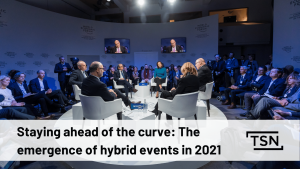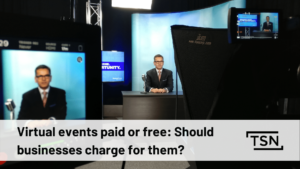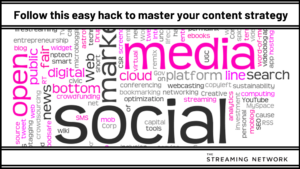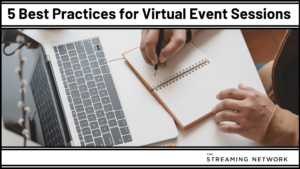It’s been said time and again, but the Covid-19 pandemic has shifted the dynamics of the corporate world, particularly the way we host events. Once on the periphery, delivering your content via webinars and virtual events is now en vogue.
With this rise in popularity comes a big question – virtual events, paid or free? Should you monetize or remove the barrier for entry? Businesses and event planners alike are competing to find the right balance while delivering a meaningful experience for their attendees.
Yes, on average, virtual sessions are less expensive than their traditional in-person counterparts. However, the question of whether to charge has no clear-cut answer. There are several factors that need to be weighed, ranging from event promotion and selling sponsorships to driving attendance and managing audience expectations. Take a good hard look at your business too: What are your goals, pain points and priorities? Are you looking for a way to make extra money or reach as many people as possible?
Although we can’t decide for you, we can guide you step-by-step through the pros and cons of monetizing your webinars and virtual events, while offering some possible alternatives.
What is a virtual event?
A virtual event is a shared online experience with a group of people, of varying sizes, on a specific topic. They come in different formats, including webinars and pre-recorded content, and lengths, ranging from under an hour to a couple of days for conferences. Each one gives attendees an opportunity to interact with its material and one another, using tools such as group chat, surveys or polls, which mimic in-person engagement.
At minimum, businesses use these events to establish relationships with their prospects and collect their information, but if the opportunity is there, they can turn them into a source of recurring revenue.
What do successful webinars & virtual events look like?
The best webinars and virtual events have one thing in common – strong engagement. However, this is something that most event organizers struggle with, as attendees are only engaged for 53% of virtual sessions.
Why? Too much passive watching. Even with the greatest, most exclusive content in the world, if you don’t get active discussions from your audience, you’re squandering a golden opportunity. The key to improving your engagement levels is to provide interactive features (such as polls or group chat) as well as diversifying the types of webinar sessions and event types you hold; focusing in on smaller sessions is highly recommended.
A great example of engagement done right is this debate-style virtual session from Snöball and Matchbox Virtual Media. Mixing humour and interactivity, the event sees people taking sides on a divisive topic and in a way, creating their own experiences.
If you’re struggling to engage your virtual audiences or just need help crafting your next webinar or large-scale virtual event, the experts at The Streaming Network have you covered.
How much does a virtual event cost?
Regardless of whether you charge or not for your event, there are associated costs for hosting one, such as software, booking presenters, video equipment and promoting your event. The exact price will vary depending on the scale of your webinar sessions and the number of attendees, but it can start from a few thousand to tens of thousands.
Thankfully, there are ways for businesses to recoup costs, such as charging an entry fee or securing sponsorships. The average attendee fee of a paid event in the latter half of 2020 was $443, with an average of 14 sponsors.
Should your business charge for a virtual event?
Did you know that only 50% of registrants convert to virtual event attendees? It’s difficult enough to get people to register for virtual events, much less follow through and show up. Keep this in mind when your team is deciding to charge an entry fee – the less hurdles there are, the more attendees will show.
And then there’s the matter of engagement. Based on our experiences delivering conferences, we found that on average people were engaged for longer during paid live events over free ones (9 hours versus 3.5 hours).
When making your decision, ask yourself the following questions:
- Is your content required for training or credits?
- What is the demand for your content?
- What’s your priority, revenue or engagement?
- What does your audience expect from your events? Is your material usually free or purchased?
- If this event were in-person, would you also charge your audience?
- How long is your event? (i.e., 1-day webinar versus a multi-day conference)
- How expensive is your virtual event delivery? (i.e., promotion, cost of your virtual platform, content production times)
- How big is your event and what types of attendees are you expecting?
Benefits of a paid virtual event
There are a few reasons why it’s worthwhile charging your audience to attend.
Higher quality of leads
With an entry fee you’ll have less people attending the event, but the leads will be better. Considering the cost of some paid virtual events, it’s safe to assume that those who do register and attend are truly interested in your topic and content as well as any future offerings. After all, it’s human nature to value things more if it costs us money.
Maintaining your value
When your event is free, you may be setting the wrong expectations for your audience. Charging implies that the content being provided has value and positions you as a more premium service.
Source of revenue
Depending on your business’s goals and objectives, a paid virtual event could be an excellent opportunity to add another revenue stream.
There are a number of avenues for this – you can charge by the event or even tack on a membership or subscription fee to gain access.
Benefits of a free virtual event
Did you know that 80 per cent of virtual event registrations are free? While there’s a time and place for paid events, free virtual sessions are the most common and the most attended.
Here are a few more benefits of a free virtual session.
Collect more data
If the goal isn’t necessarily to generate revenue but to collect information on potential prospects, hosting a free virtual event is the logical choice.
Free sessions naturally attract more registrants than paid ones. This allows you to build up your lead database, even if only some registrants attend. Moreover, your company can build a relationship with the target audience. By delaying monetization and providing quality content free of charge, you build trust. This is valuable as you can charge them in the future for your products and services, instead of just for this event.
Remove as many hurdles as possible
We’ve touched on this before but it’s generally quite difficult to convince people to carve out time to attend events, virtual or otherwise. While it’s no guarantee, keeping the barrier of entry low helps. If they have to pay, they might second guess joining, especially if the fee is high.
Alternative approaches to monetization
Instead of charging attendees at the door, it might be more fruitful to charge them during the event. A freemium session is the perfect opportunity to expand your reach, tease your content and show your experience, without giving everything away for free.
If your audience decides they do want more, they can pay for exclusive content, events or engagement options. And if they pay to receive the content, you know you’re dealing with a quality lead.
Post-pandemic wrinkle: Hybrid events
As we emerge on the other side of the Covid-19 pandemic and restrictions are lifted, many businesses will be transitioning from a strictly virtual to hybrid event model. These sessions leverage the best aspects of the virtual and physical world, allowing attendees to attend in-person or to continue to interact remotely, depending on their level of comfort.
This switch will raise a question or two, such as:
- What are the best practices for hybrid experiences?
- How can businesses manage audience’s expectations?
As more and more businesses begin to offer hybrid events, they will need to decide how to price their event accordingly, without alienating in-person or remote attendees, and losing out on potential leads. The last thing you want to do is to make either group feel like they’re missing out.
Do you offer price discounts? How does your business distribute costs across the physical and virtual venues? We produce hybrid events and these are just a few of the challenges our clients face.
Beyond that, businesses will need to manage their audience’s expectations for a hybrid event. If you’ve been offering your events for free during the pandemic, your attendees will expect more of the same. Should you wish to monetize or remonetize your content, you’ll need to find a smooth transition – value is value, regardless of the medium of delivery.
Final thoughts
Virtual events, paid or free, that is the question. When it comes to this issue, there’s ultimately no one size-fits-all strategy. Free webinars and events make up the large majority, but paid ones tend to be where the most innovation happens.
Both avenues are valid; it all comes down to your specific goals and objectives. Your company needs to evaluate things as a team during the event planning process to make the best possible decision for your next virtual event.
However, as we all shift towards a hybrid future, post-pandemic, the conversation about monetization will likely shift again. Event organizers and businesses will need to answer key questions while continuing to deliver good value.
If you need more help with your next webinar or virtual event, whether it be setting it up or creating engaging content, reach out to one of the experts at The Streaming Network today! And check out our state of the art Engage Webinars platform.
We’re passionate about creating compelling virtual & hybrid events that people want to attend.






